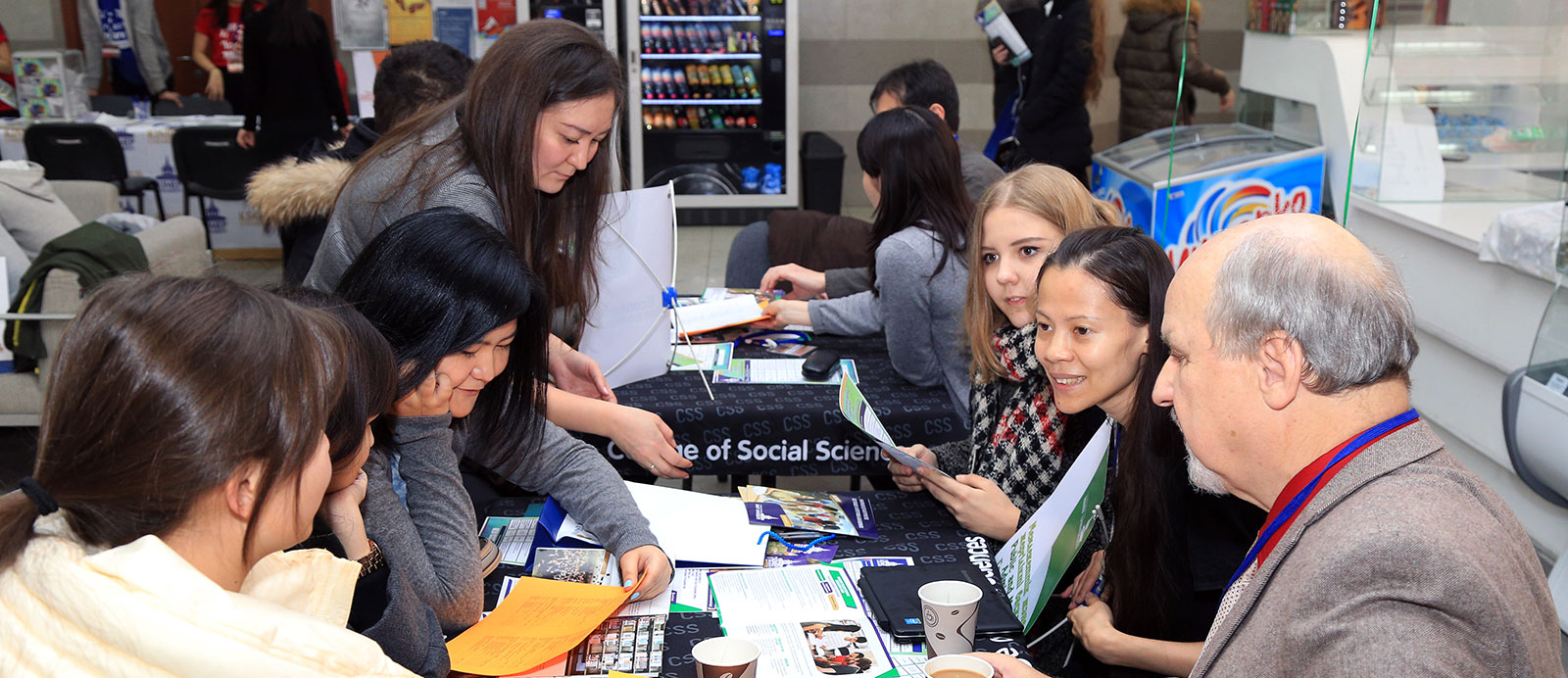- Career portal
- Internship and part
time job - Vacancies for FRESH
KIMEP graduates - Job Vacancies for
experienced candidates - Internship/Job opportunities abroad
- RESUME/CV, INTERVIEW GUIDES
- Employment Statistics
- Events
- JOB FAIR
- SPEED NETWORKING
- Universum Reports
- Personal Consultations
- Our partners
- CONTACTS
Career portal
HIGHERED

HIGHERED
The Worlds Top Employers in One Closed Exclusive Network – Available Only for EFMD Schools and Students
KIMEP University as a member of EFMD Global Network is pleased to offer KIMEP students access to online international internship search – HigherEd.Starting now you can activate and log in to your personal portal to find internships, trainee positions and graduate positions that are relevant to you in companies worldwide.

LinkedIn
LinkedIn is the world’s largest professional network on the internet.You can use LinkedIn to find the right job or internship, connect and strengthen professional relationships, and learn the skills you need to succeed in your career.
LinkedIn has a powerful job search tool that can find openings around the world. You can then filter these results by company, experience level, and more. Some openings also have an Easy Apply option, which allows you to apply to a job with only a few clicks by submitting the information in your LinkedIn profile.
What are the benefits of LinkedIn?
- LinkedIn allows you to build a virtual network of contacts
- Job/Internship Searching
- Research Companies
- Build Your Brand.
- Demonstrate Your Credibility
- Information Hub
A LinkedIn profile is a great way to let people know who you are and what interests you.
So make sure it is complete and describes you properly.
Career Center was established in 1996 with a purpose to build strong cooperation between business community,
alumni and students of KIMEP University.
Career Center provides students from their first year of study and alumni with all necessary tools to
successfully manage professional development:
- career advising
- career events
- recruitment and employer outreach programs
- networking opportunities
Career Center mission is:
- providing with full range of services in career skills development
- creating and strengthening partnership with companies-employers
- promoting KIMEP University brand name
Employment Opportunities
Universum Reports
Universum Talent
Research 2020
Universum
Talent Research 2019
Universum
Talent Research 2018
Employment Statistics
KIMEP University prepares highly-qualified professionals with great leadership potential and decision-making
abilities. The leading national and international employers from Banking, Finance, Consulting,
Manufacturing, Oil and Gas, and Logistics spheres hire KIMEP students. The average level of employment among
KIMEP graduates is 93% within first three to six months after graduation.
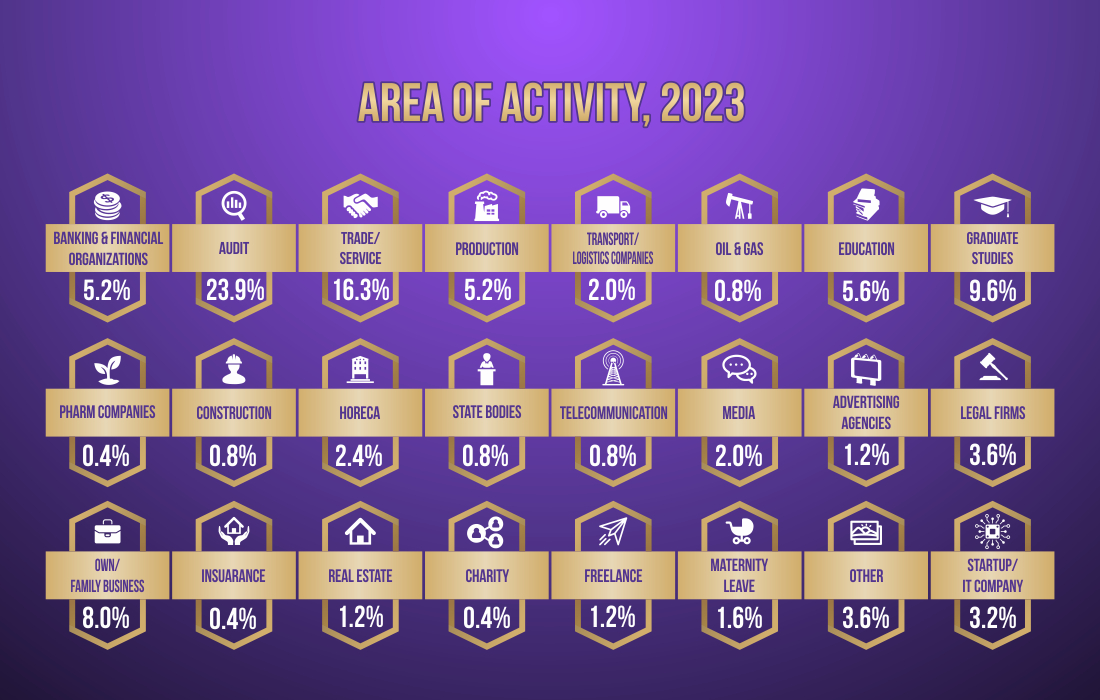
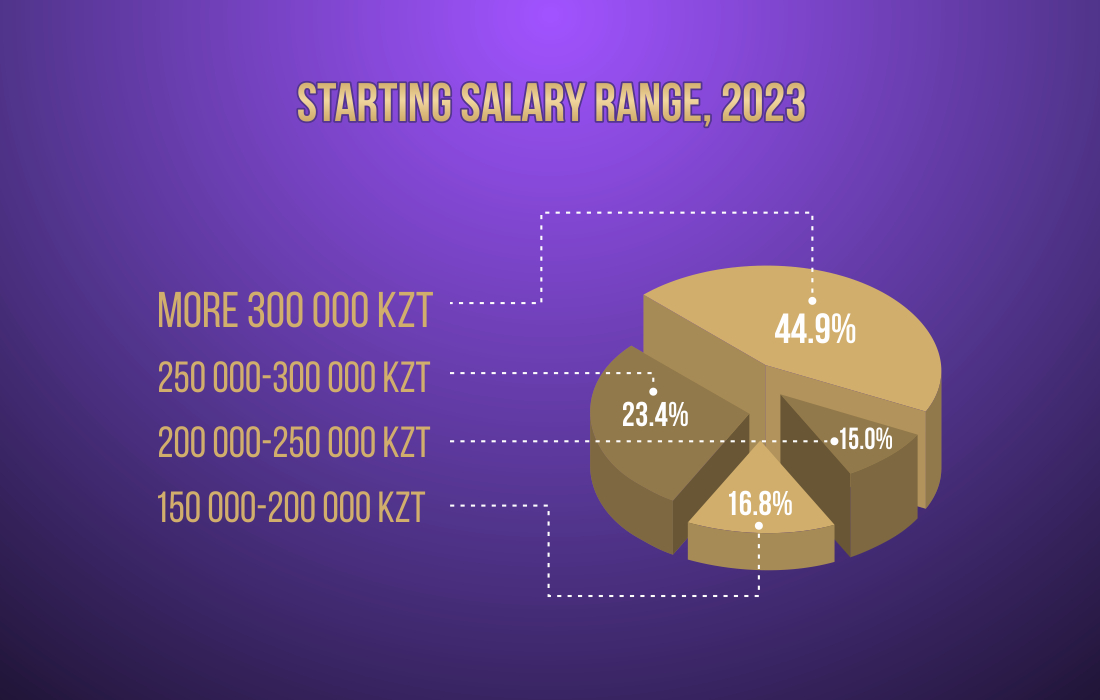
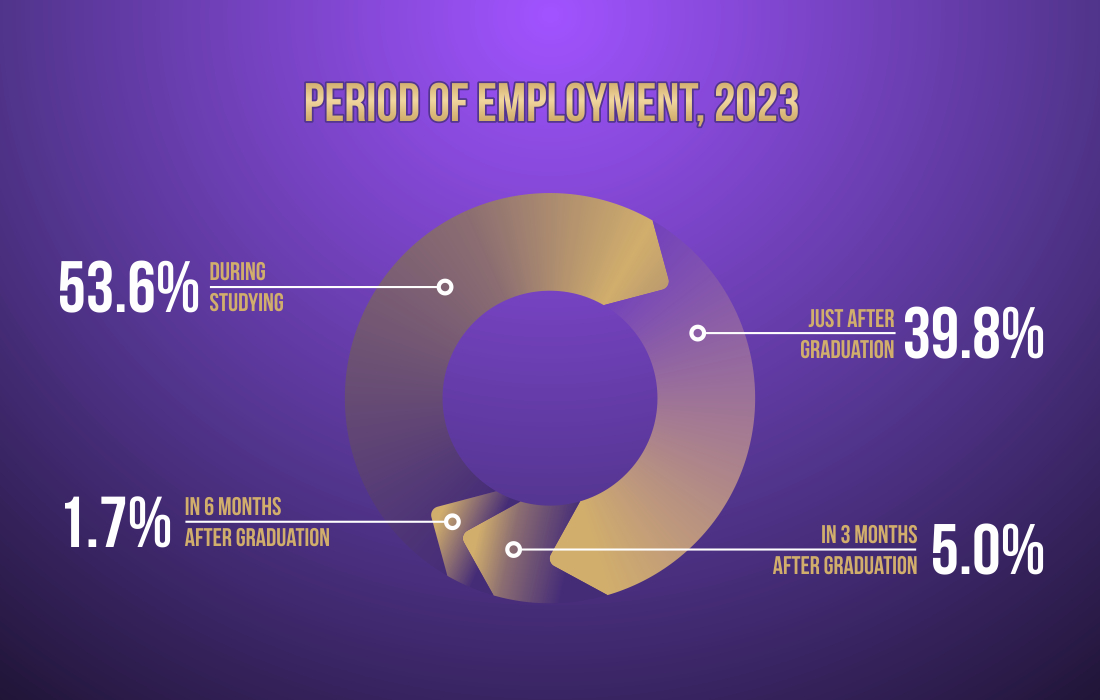






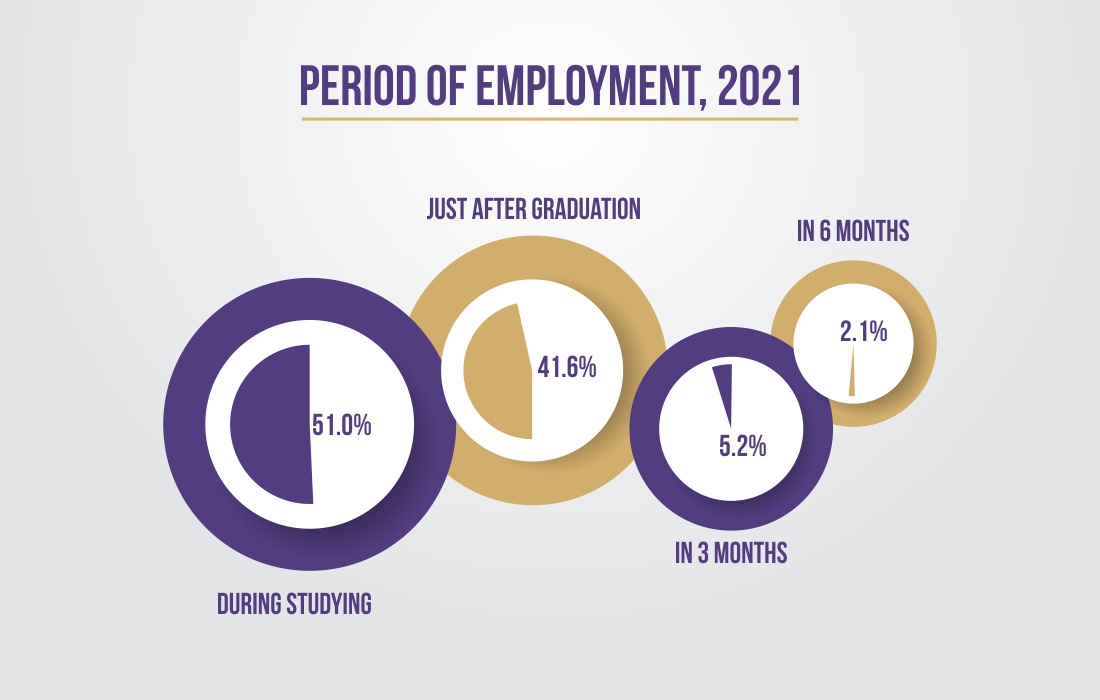

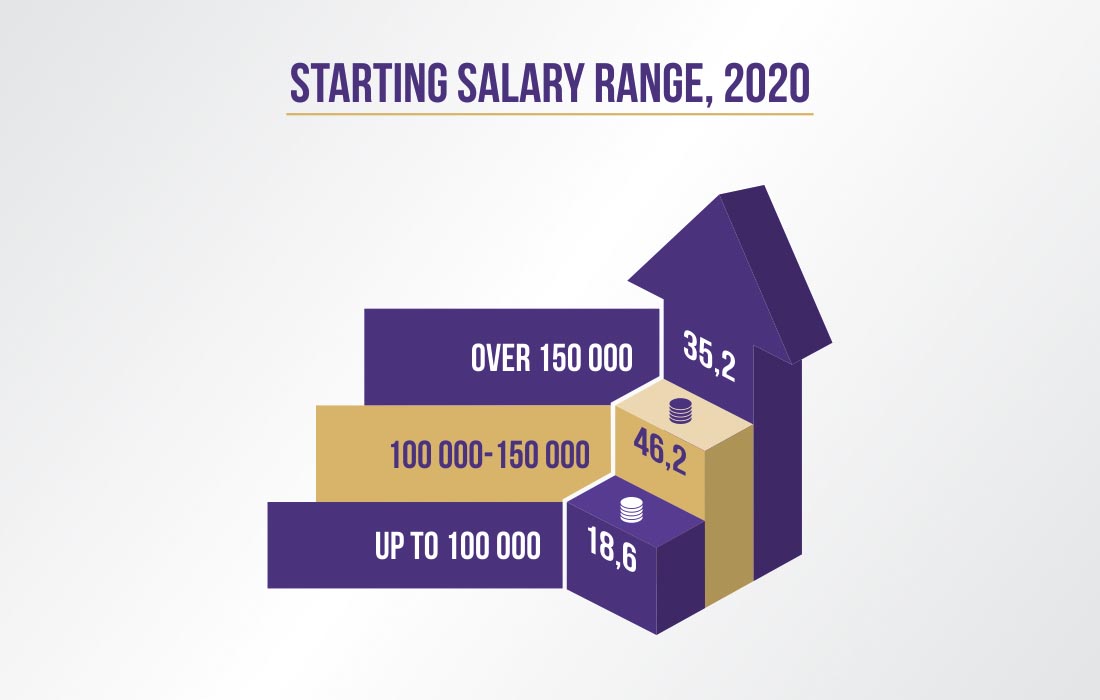
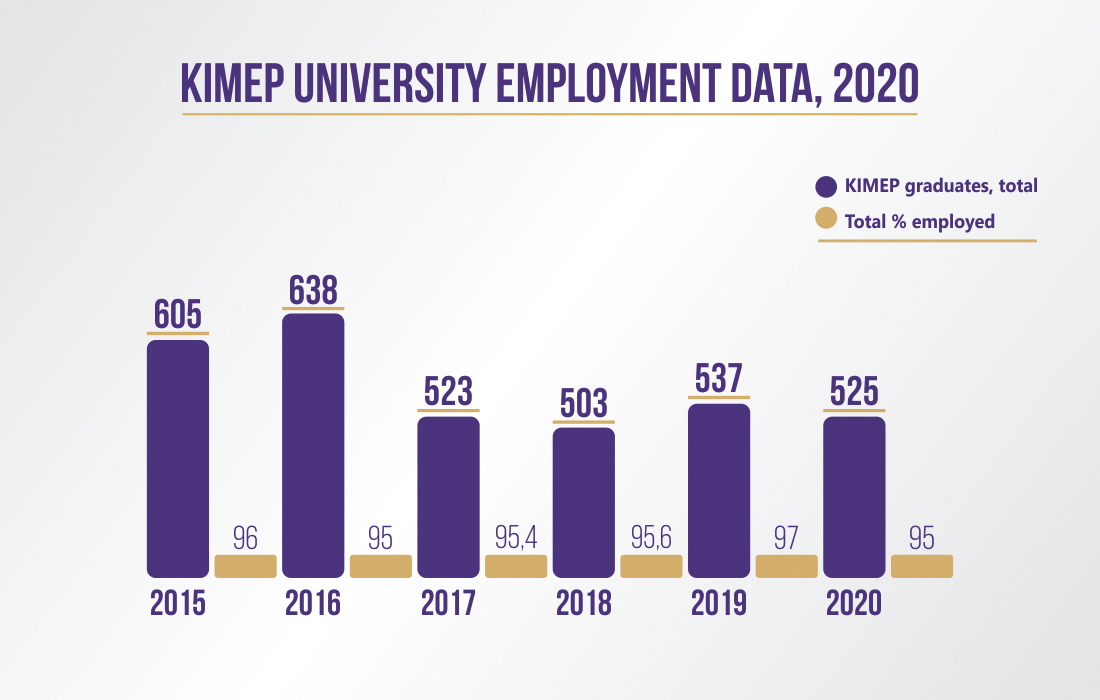
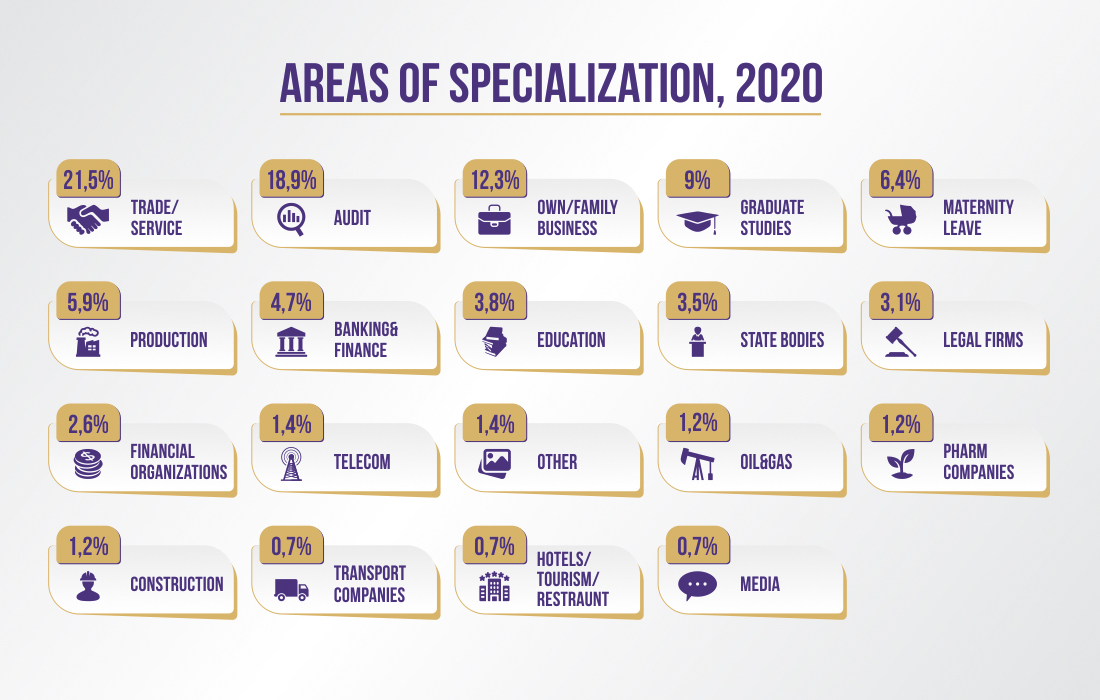
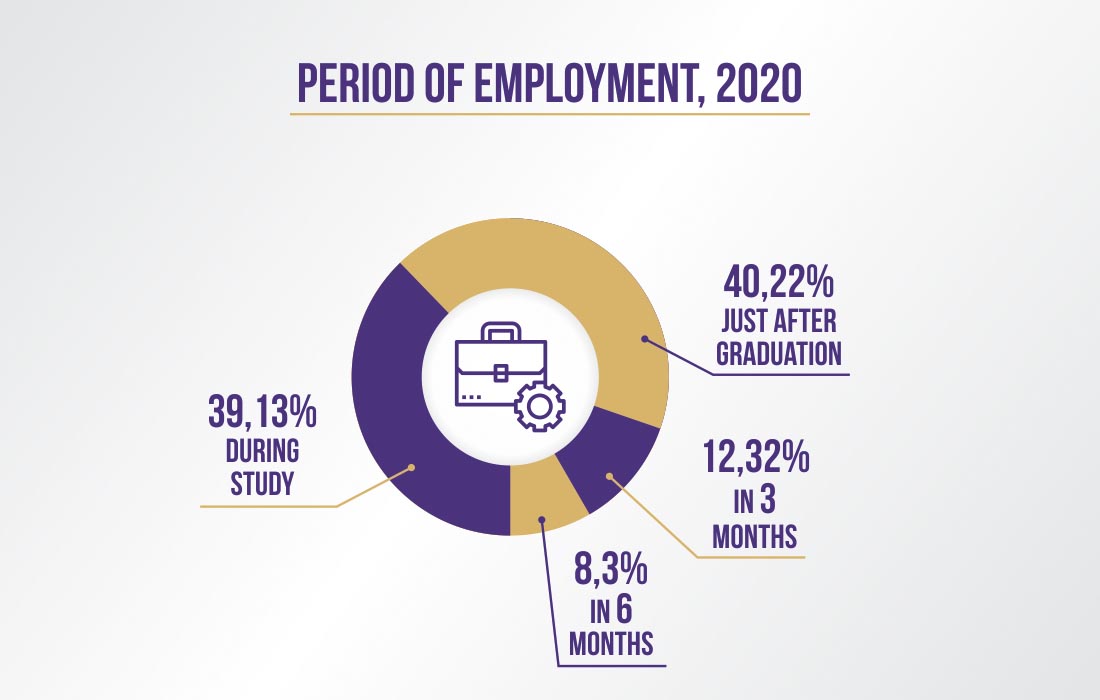



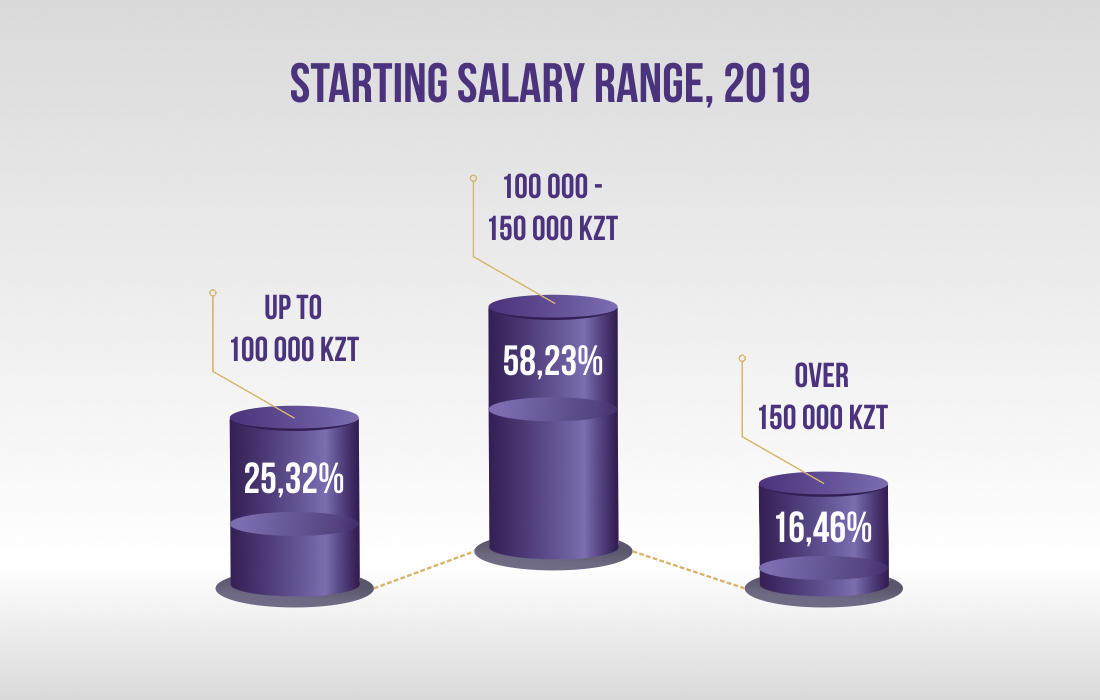












Job Fair
The KIMEP University Job Fair is an annual event, which provides University students, and future graduates a
unique opportunity to meet national and international employers, ask them all relevant questions, conduct
interviews, and apply for vacancies. Moreover, it helps students to understand various opportunities and
perspectives and to choose the right career path for themselves.
Over 50 companies participate in the KIMEP University Job Fair on an annual basis, among which there are the
Big 4, the Big 3, leading FMCG companies, international oil and gas companies, banks, and more.
2023
KIMEP Job Fair 2023
On April 7, 2023 CDD and Career Center conducted a large-scale KIMEP Job
Fair 2023 on campus.
44 companies from different industries (FMCG sector, financial organizations, production, audit,
consulting, telecommunication, hotel, governmental organizations and many others), about 400 students
and graduates participated in it.
We hope that our students received exhaustive information on their activity, made a right choice for
their career development paths and companies have found talents to fill in all openings.
In the “CV Clinic” students had an opportunity to get advice on how to compose and improve their resumes
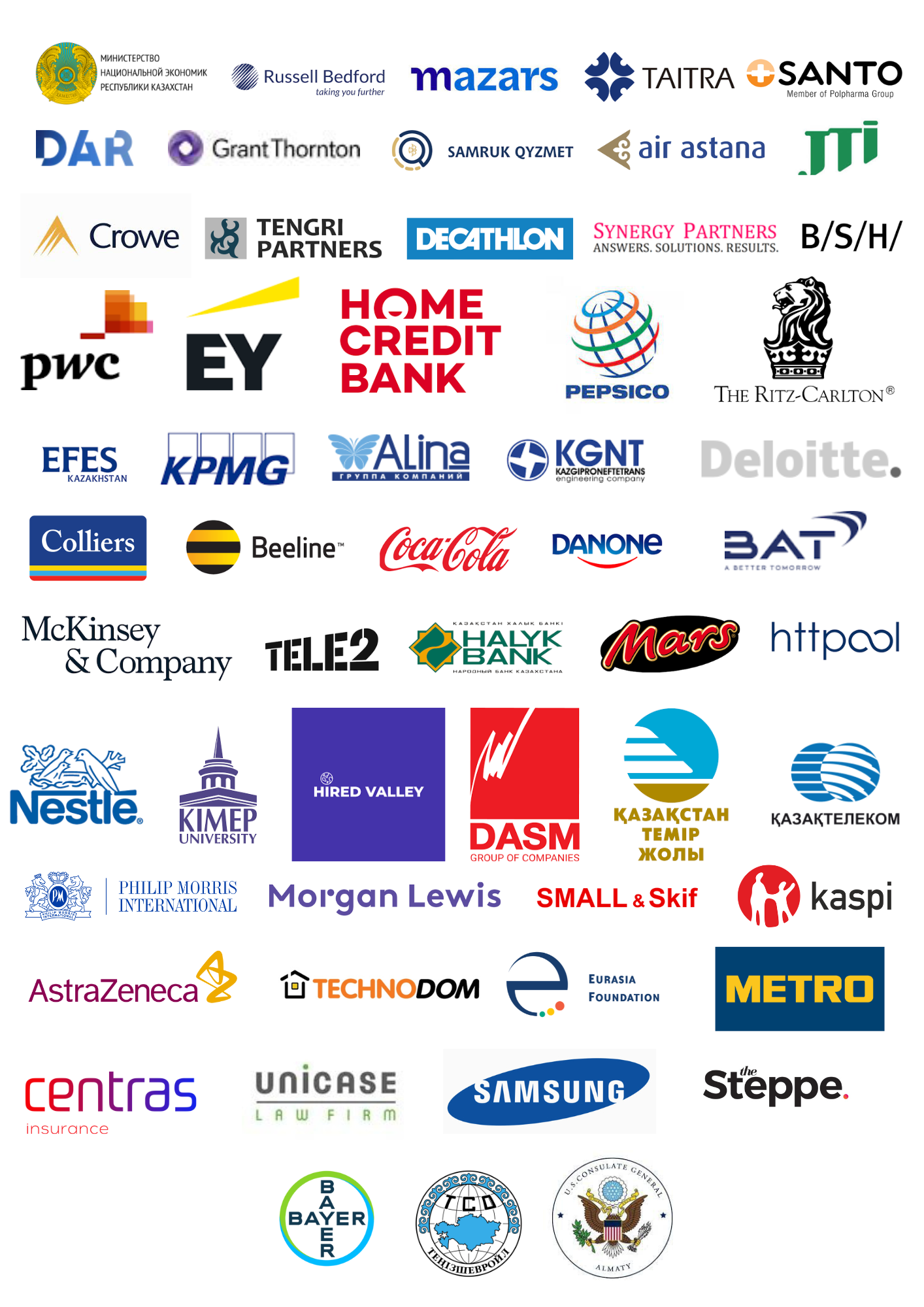
And about 400 students and graduates.
Also, we organized:
- TwoCV Clinic
Corners with Career Counsellor -Meruyert Adaibekova, Associate Adviser, PhD, MBA
and Alfiya Mustafina, a Career Counselor. They reviewed about 100 students’ CVs and gave advice
on how to improve it. - IELTS preparation master classby our Alumni mentor
Anar Galiaskarova, the founder of the Grenadine Language School.
2022
KIMEP Job Fair 2022
The main goal of Job Fair is to assist KIMEP graduates and students to be familiar with current labour
market and find appropriate job and internship placement. There were 37 companies- participants
- Air Astana
- Fly Arystan
- Alina Group of companies
- Almaty Akimat
- ABRIS Distribusion Kazakhstan
- Beeline
- British American Tobacco Kazakhstan
- BSH Home Appliances
- Centras Capital
- Coca Cola
- Colliers International
- Deloitte TCF
- DASM Group
- DANONE
- EFES Kazakhstan
- Engineering company “KAZGIPRONEFTETRANS” PricewaterhouseCoopers Tax & Advisory
- Eurasian bank
- TengizChevrOil (Atyrau)
- MAZARS
- EY Kazakhstan
- Grant Thornton
- HomeCreditBank
- Halyk bank
- International company “Scientific publications – Publ.Science”
- Kolesa Group
- KPMG Kazakhstan
- MARS
- Nestle Kazakhstan
- McKinsey & Company
- Metro Cash and Carry
- Morgan Lewis
- Philip Morris KZ
- Synergy Partners Law Firm
- Samsung
- Technodom
- Unicase
And about 400 students and graduates.
Also, we organised
- CV Clinic Corner with Career Counsellor -Meruyert Adaibekova, Associate Adviser, PhD, MBA. She
reviewed about 50 students CV and gave an advice on how to improve it - Ruffle prizes among students participants. Our partner- Optimum Recruitment & Executive
Search will test 5 winning students using the Business Profile test methodology and subsequent
consultation / interpretation of the test results.
2021
KIMEP Virtual Job Fair 2021
2020 has changed the life of the whole world and set new rules for everyone. The pandemic did not
bypass the work of KIMEP, but this did not interfere with the holding of the annual the biggest
KIMEP recruitment event- Job Fair. In 2021, the Job Fair was held for the second time ever in a
virtual format on the Zoom platform.
The Job Fair was conducted on April 1-2, 2021 by the Corporate Development Department. The event was
very successful: 678 participants (students, graduates, alumni) and 38 companies- employers from
different areas of activity took part in the event: McKinsey & Company (Moscow), PWC, Philip Morris
Kazakhstan, Coca Cola Ichereck Kazakhstan, Danone, Sberbank, Karachaganak Petroleum Operating (Aksai),
Tengizchevroil (Atyrau), Sanofi, Integrites, EY, JTI Kazakhstan, Nestle, EFES Kazakhstan, Technodom, BI
Group, Transtelecom (Nur-Sultan), Halyk bank, Unicase Law firm, Richfit International, Deloitte, BAT
Kazakhstan, PepsiCo, DASM Kazakhstan, Beeline, Kolesa Group, Home Credit Bank, Evrika (Shymkent), Alina
Group of companies, KPMG, Grant Thornton, Avon, Synergy Partners, Hilti International, Sulpak, MARS,
Naimi.kz, KAZGIPRONEFTETRANS.
In addition, 7 rooms of CV clinics were organized, where experts (Ancor recruitment company, HiPO,
Beyond Curriculum, Career and Employment Services) reviewed students’ CVs and gave advice on how to
improve it. About 100 students took active part in CV writing works.
HiPO also organized an interesting test in Kahoot, the winner of which got the opportunity to receive
individual advice on creating a profile in LinkedIn.
Many companies organized interactive events and gave students the opportunity to receive great prizes.
Nestlé raffled off its products for participating in the quiz, PWC presented a sweatshirt, and many more
examples of excellent preparation of companies for the event. Each company has prepared a comprehensive
presentation of the company, job vacancies, internships, and selection process. Students actively asked
questions and received answers directly from company representatives regarding obtaining dream jobs.
Companies really enjoyed the event and the active participation of the students.
2020
In 2020, the KIMEP Career and Employment Services for the first time in
Kazakhstan, together with the HiPO team, organized an online job fair Job Fair LIVE on Instagram – for
students of all universities and young professionals! ⠀
The participants had the opportunity to:
-Learn about career opportunities in the best companies in Kazakhstan
-Ask experts of your interest
-Take the first steps to success
From April 20 to April 30, a representative of each company had live on the Instagram page
(https://www.instagram.com/hipokz/)


2019
This year Career and Employment Services (CES) gathered data base of 2019 KIMEP
graduates and 3d year students’ resumes for our main clients-employers.
39 companies- participants
| McKinsey&Company | Efes Kazakhstan JSC FE | Coca Cola Almaty Bottlers |
| Ramstore | Philip Morris Kazakhstan | CocaCola Company |
| Air Astana | L’Oreal Kazakhstan | «Nestlé Food Kazakhstan» LLP |
| Deloitte TCF, LLP | Halyk Bank | Danone |
| EY | Kazakhstan Max CooperOiltech LLP | Mars Central Eurasia and Belarus |
| KPMG Audit LLC | ТОО “BDO Kazakhstan” | DASM Kazakhstan |
| PricewaterhouseCoopers Tax & Advisory LLP | Grata Law firm | JTI KAZAKHSTAN LLC |
| Moore Stephens Kazakhstan |
ТОО Muratov Law Firm | ТОО «BSH Home Appliances” |
| TMF Kazakhstan LLP | Avon | «Mobile Telecom-Service» LLP |
| Takeda Pharmaceuticals International | KCell | ACT Kazakhstan |
| British American Tobacco Kazakhstan | Parmigiano group | Kazaktelecom |
| Grant Thornton LLP | Synergy Partners Law Firm | Prime Capital Holding |
| Technodom | Atasu Group | Changellenge Kazakhstan |
And about 400 students and graduates.
As a bonus, to increase chances to get a dream job, KIMEP CES team has prepared
- Master class from ANCOR recruiting company to test interview preparedness- MOCK Interview
- Master class from EY for students looking career in EY
- Selection process by Coca Cola company for internship program
2018
KIMEP JOB FAIR 2018 is an annual event for KIMEP Community. This year Job Fair
took place on April 6, 2018.
This Job Fair was a great opportunity for KIMEP Students to be acquainted with the 39 leading companies
on labor market.
Students received a chance to find out about vacancy opportunities at the companies and recommend
themselves for the future employers.
Besides that, Career and Employment Centre of KIMEP University has prepared useful activity for the
students by organizing MOCK Interviews:
1. ArchiteCT team assisted to practice answering competency-based questions.
2. Head Hunter team helped to get into shape with passing different interview styles – stress, case, and
classic.
These simulation interview activities helped KIMEP Students to increase their preparation level for the
future job interviews.
Another feature of the KIMEP Job Fair was special student guest invited straight out from American
University in Central Asia, Bishkek.
Thank you to all the company participants:
We hope that our students will be become a valuable employees at your company!
We look forward to our mutual cooperation and we will see you next year!

2017
This year Career and Employment Services upgraded the format of annual Job Fair
and conducted three events devoted to 25-th Anniversary of KIMEP University:
- Round Table
- Job Fair
- Future Talent Sessions
From the early morning there was a Round Table “Higher Education-Employment: New
reality” devoted to very actual issues of employment and education: higher education at the
threshold of change, university of the future, key skills in post-industrial era, new demands of
employers, personnel for innovative economy and information society, what is employer’s brand, why do
graduates chose particular employers, and so on.
Speakers:
– David Mashuri, Managing Director, QazKom
– Karl Johan, Universum Global, Sweden, Global COO & MD EMEA (chief operating officer & managing
director emea)
– Saltanat Alirakhim, Director, ASSET HR Company, Certified HR specialist (GRP, Worldat Work)
– Saltanat Abiltayeva, Optimum Recruitment&Executive Search
– Nurlan Shakhmed, Certified trainer of Process Communication Model, MBTI, OOP, Oxford.
Presentations of speakers you can see on
https://drive.google.com/drive/folders/0B0eomT4cZu8OY3laVTFVMVBIa1U?usp=sharing
After Lunch, there was a KIMEP Job Fair.
The main goal of this important event is to assist our graduates and students to be familiar with
current labour market and find appropriate job. This year Career and Employment Services (CES) gathered
data base of 2017 KIMEP graduates resumes for our main clients-employers.
51 companies- participants
| EY | Philip Morris KZ | Danone | ТОО «Business & Technology Services» | Forbes Women |
| PWC | JTI | L’Oreal | 3M | Partners Media Group |
| KPMG | Imperial Tobacco | Coca Cola | Adidas | Belgium embassy |
| Deloitte | British American Tobacco | Kimberly Clark | Efes Kazakhstan JSC FE | National Business |
| Grant Thornton | Synergy Partners | Ramstore | АО “Самрук-Казына” | Moore Stephens Kazakhstan |
| Halyk Bank | Grata | Fircroft | LomerBridge Point | АО «АК Алтыналмас» |
| QazKom | Unicase | TCO | BDO Kazakhstan | Dentsu |
| McKinsey & Company | Kcell | Hilti | Air Astana | MARS |
| kaspi bank | Nestle | Sanofi | AVON | Procter&Gamble |
| Altynbank | Colgate | Rits Carlton | Apple City Group | U.S. Consulate General |
| Elite | Nur.kz |
During Job Fair there were Future Talent Sessions – new format of networking between
employers and KIMEP graduates: an opportunity for any graduate to make self presentation during 2
minutes in a front of companies representatives: as a result – Some students have already got job
offers from companies you can find photos here
https://drive.google.com/drive/folders/0B9B-fmz3r-XqeG53SEdDRi1Ddzg?usp=sharing
2016
The 21-st KIMEP University Job Fair 2016
The 21-st KIMEP University Job Fair took place on April 1, 2016.
51 companies participated in the event. Among them:
PricewaterhouseCoopers Tax & Advisory LLP, Deloitte TCF LLP, Kimberly-Clark CIS, Raimbek Bottlers,
Synergy Partners Law Firm, JTI Kazakhstan LLP, British American Tobacco Kazakhstan Trading LLP, McKinsey
& Company, PHILIP MORRIS KAZAKHSTAN LLP, Chocofamily, Danone Berkut LLP, Coca-Cola Almaty Bottlers,
Hipo, VTB Bank Kazakhstan, Forte Bank, L’Oreal,Mars CEAB (Central Eurasia & Belarus), Pocter and
Gamble, EY, Verny Capital Group, АО «Altyn Bank», Santo Member of Polpharma Group,ТОО “BDO Kazakhstan”,
Colibri Kazakstan, AISEC, KPMG Audit LLC, PIFAGOR, Carlsberg, GRATA Law Firm, Hilti Kazakhstan, ТОО
“КаР-Тел”/TM Beeline, АО “kaspi bank”, Bank CenterCredit, Air Astana LLP, Imperial Tobacco Kazakhstan,
Halyk Bank, ASAP, ADVANCE , Apple City Distributors, Kcell JSC, Grant Thornton LLP, Organising Committee
for the International Sports Events in Almaty, Inculerate, SIGNUM Law Firm, Lamoda, DASM Group,
Business&Vlast (Publishing House), Flow Kazakhstan, Tsesna Capital, Bank HomeCredit, Idea-lab.
During Job Fair there were four Master Classes:
-Learning Agility/David Mashuri – Partner, Country Manager Kazakhstan at WE Partners, an Alliance of
Korn Ferry
-Want to be manager/ Leili Ushurova, HRD,ChocoFamily
-Problem solving and communication skills/McKinsey&Company
-Presentation of Global Graduate Programme/British American Tobacco
2015
2014
2013
2012
2011
Participants
Services for the students
Internship opportunities
An internship is:
– A structured work experience related to a student’s major and/or career goal.
– An experience that should enhance a student’s academic, career, and personal development.
– It might be paid or unpaid, part-time or full-time.
– An experience that is mutually agreed upon by the student, supervisor and/or faculty member.
– It’s important to note that to qualify as an internship the position does not have to be labeled
“internship”. Many part time jobs, volunteer opportunities, or even summer jobs can qualify as an
internship. Internships might also be called a practicum.
Internship helps students:
– Reinforce academic and career objectives and personal values related to work;
– Identify the skills they need to enter a given field;
– Gain practical work experience in the field of interest to balance the classroom training;
– Learn by doing in a setting where you are supervised by a work-place professional, and have the
opportunity to achieve your own learning goals, without the responsibilities of being a permanent
employee;
– Get an edge in the competitive job market over those individuals with no relevant work experience;
– Get a full-time job upon graduation.
FAQs: Questions and Answers
What does Career and Employment Center
represent?
Career and Employment office provides KIMEP students, graduates with the career skills and employment
services. Career and Employment Office is able to market students’ professional qualities to the
broadest range of potential clients, offering the greatest opportunity to choose the job you want.
What services does Career and Employment office provide to students?
Career and Employment Office provides services such as
- Consultations/trainings/master classes/workshops on career skills development (cv writing,
interview techniques, dress to impress, etc) are given to KIMEP students and graduates by CEO
staff and invited Human Resource Directors form various companies
- Internship is an excellent chance for KIMEP students to receive a real work experience, to apply
theoretical knowledge in the best international and local companies working in Kazakstan; to
present themselves in a company as a potential employee, to get practical experience and
knowledge on a particular area from working professionals, and to network for their future
career.
- Annual KIMEP Job Fair is a unique opportunity for KIMEP students and graduates to tell about
themselves, to get acquainted with representatives of the companies, to receive the exhaustive
information on their activity, to make a right choice of workplace.
Assistance is provided to employers seeking either full or part time employees
How to apply to the vacancies pointed on the website?
Choose the vacancies you are interested in, copy and send to plof@kimep.kz
How to write CV, cover letter?
How much is it important writing cover letter?
The first purpose of writing the Cover letter is to show that you want a placement job – giving very
brief details of how long, when and possible areas of interest. The second purpose of the cover letter
is to encourage employers to read your CV.
How much time does it take to find the job after graduation?
Usually it does not take much time for finding the job after graduating from KIMEP. Many students prefer
working during their study.
What specialization is demanded on a market place mostly?
All specializations are in demand on a market place. But graduate should take into account that it is
necessary to be competitive among other graduates.
Will I have the possibility to work abroad after graduation?
There is possibility to work everywhere, but Career and Employment Office does not provide with job
opportunities abroad
What is starting salary range?
With what companies does Career and Employment office work?
Career and Employment Center cooperates with such large multinational companies, international companies
operating in Kazakhstan and new emerging and well established national companies, institutions and
organizations as Citibank Kazakstan, Procter&Gamble Central Asia, Schlumberger, USKO International,
Ernst&Young, Karachaganak Petroleum Operating (Aksai), LG Electronics Almaty,
PriceWaterhouseCoopers, KPMG, Bolashak (the Western Kazakhstan), OJSC TemirBank, Philip Morris
Kazakhstan, OJSC Kazkommertsbank, OJSC Bank CenterCredit
Who can help me with my resume and cover letter?
You can see the examples of CV writing on KIMEP website and Cover letter writing or you can get
personal consultation from Career and Employment Office.
How can I prepare for interviews?
Please see skills development or you can get personal consultation from Career and Employment Office.
Do the employers pay attention to GPA grade or experience?
Some employers use GPA cut offs in considering applicants. Other employers stress the student’s overall
background: experience, number of hours worked during the school year to finance college, leadership
activities, etc. Many employers rate leadership activities even more highly than GPA. Students who were
very active in high school activities may be less involved in college extracurricular activities. It is
more valuable for a student to be involved in a few meaningful leadership roles on campus.
For what skills employers put more emphasis nowadays?
Most employers today put more emphasis on graduates’ skills as well as on their academic majors. It is
important develop strengths in at least two or three of the following areas:
- Computer skills (e.g., programming, word processing, spreadsheets, data base management, e-mail,
Internet); - Quantitative skills (e.g., accounting, statistics, economics);
- Communication skills (e.g., written and oral);
- Marketing/selling skills (e.g., sales, publicity, fundraising);
- Scientific skills (e.g., lab skills, scientific research);
- Foreign language skills;
- Leadership skills (e.g., supervisory, extracurricular leadership roles, teamwork/team leader).
When can I start consulting with Employment and Career Center?
A: Students should begin using Career and Employment service no later than their graduation year.
Virtually all career offices provide individual career consulting/advising, career planning workshops,
internship assistance, and job fairs and programs – these services are specifically for freshmen and
undergraduate students. You should start early with choosing a career and preparing for it. Competition
for good jobs, particularly in certain fields is stiff.
Preparation for an interview
What is an interview?
The purpose of the interview is to convince the employer to offer you the placement position, while at
the same time ensuring that the job is right for you.
An interview is a two-way process:
The employer is trying to assess whether you:
match the specification of the job for which you are applying, and
“fit in” to that part of the organization.
Students are trying to:
find out whether the job is right for them
convince the employer that he/she should offer it to you.
The Employer’s Viewpoint
The employer is looking for evidence on which to base his decision or recommendations. Most people of
your age have only a brief record of performance, almost all of it is academic, therefore vacation work,
sporting activities, membership of clubs and societies, active participation in the Student’s Union may,
rightly or wrongly, be seen as evidence of your initiative, your ability to fit in, to organize or to
communicate.
The employer is deciding whether to invest a fair amount of money in you. Therefore he wonders “what is
the likely return on this investment?”. He is asking if your aspirations tie up with the job and
prospects his organization can offer. He may not just be interviewing you for the placement job but
trying to assess your potential in the longer term. This is why he may be trying to identify in you the
ability to communicate, to lead, to organize – even if the immediate job does not require these
attributes.
Students Objectives
Students are trying to do two things:
One is to assess whether the job and prospects actually match up to what
you want. You will probably modify your ideas on what you want in the light of what you are told.
You are also trying to convince the employer to invest in you. Perhaps that you are a better
investment than your competitors.
Remember, you will be investing something – yourself. – find out all the facts needed to help you to
decide whether you should accept an offer, if one is made.
Multiple Interview
You may have to go through one or more interviews with an employer. A ‘preliminary’ or ‘exploratory’
interview may be only a short discussion with just one interviewer who is trying to assess whether to
put you forward for a ‘short list’ or ‘final’ interview. At the ‘final’ interview stage the selection
procedure is often more sophisticated and you may find yourself interviewed by a number of people,
either separately or together as a panel. Some employers may also ask you to take part in psychological
or other selection testing (such as group discussions).
Preparation for the interview
Appearance and Behavior
Improve your chances by considering what the interviewer is looking for and the impression you wish
to make. Your appearance and behavior ARE important. Remember that the interviewer will be asking
himself ‘will the candidate fit in with colleagues?’ and your appearance (note, too much jewelry, very
short skirts etc.) could form an important part of the evidence for or against.
A lot depends upon the type of job you are being interviewed for. A copywriter in an advertising agency
may be able to get away with an ‘unconventional appearance’. A salesman/woman will not, as it is
important to be acceptable to the customers, who also have prejudices (especially against long-haired
students/too many earrings!)The interview may be difficult enough anyway, so don’t make it harder for
yourself! The interviewer will appreciate it if you dress and behave appropriately.
Sort Your Ideas on Career Choice
Think about your own personal characteristics and abilities and how these match the opportunities the
employer can offer. The interviewer may ask you questions along the following lines:
- What are your particular strengths and weaknesses? Are they consistent with the demands of the
job? - Can you cope with the technical aspects of the job?
- Can you get on with people? How will you fit in?
- Can you show initiative, get on by yourself, carry out instructions from colleagues possibly
less well – qualified? - How much do you know about the job and how enthusiastic are you about it?
- What are your aspirations? Remember that the interviewer may not be only interviewing you for
the immediate job. He may be assessing your ability to expand from it – your potential’.
Therefore he will be interested in your career objectives. - Make sure that your career aims are realistic: if they are not, you may be eliminated even if
you are perfectly capable of doing the immediate placement job.
Find Out About the Employer
You should find out, and read in detail, as much as you can before the interview. If not you will not do
yourself justice at the interview. You will be unclear about the job and careers in the organization, so
you will not be able to demonstrate that you job choice is based on valid data. Be business-like and
prepare for your meetings.
Useful sources are:
- Literature provided by employers: This is normally persuasive and often slanted. You can learn a
lot about a company from the way it produces this literature. Read between the lines, identify
vagueness (usually deliberate) and important information omitted so you know what to find out
from other sources or at the interview. Try to get sight of the organization’s annual report or
report to employees. (These are usually available on request from big organizations, and will
often contain information on rate of expansion, future plans etc). - People You Know:- Academic staff, industrial tutors, friends, relations, acquaintances etc. Any
of these may have had some contact with the organization you have applied to.-Last year students
who spent their placement there. Seek them out and talk with them.- Employees of the
organization: You will often be able to meet employees when you visit the company – use this
opportunity.
Create interview plan
Prepare some notes on what you want to cover at the interview. It may or may not be
appropriate to refer to these in the interview, but you should have a ‘plan’ of what you want to bring
out at the interview. If this is clear in your mind you will be able to make these points as
opportunities arise through the interview or at the end when invited to ask questions.
And finally
Check the time and place of your interview and make sure you arrive early. Before the
interview re-read the copy of your application to the organization – the interviewer may take up points
you have made on your application. Also re-read your own interview ‘plan’.
The interview
At the Interview Be yourself – frank and truthful!
There is little point in trying to deceive the interviewer – you might even end up in the wrong job!
Help the interviewer relax by relaxing yourself and by being attentive. Be courteous and polite.
Remember that the interviewer often has a limited time to assess you and will be looking for evidence of
your abilities and personal qualities, so help by bringing out any information that you think is
relevant. (Back to your plan). In some cases it may even help if you can produce some evidence of your
academic work – for instance, if you have done some computer programming in your course and are applying
for a programming job. Do not ‘flannel’ if you do not know the answer to a question, say ‘no’.
After the Interview
Analyze your performance and see how you could have improved upon it. Did you give the interviewer all
the information necessary to make a fair assessment? By the end of the interview had you gathered enough
information about the job and the organization for you to make a decision?
Do your own debriefing. Did you introduce all your planned points? Make some notes on what went well and
less well, and why. Decide what you will do next term, building on strengths and correcting failings.
Talk to CEC specialists if need be.
If you find that you are constantly being rejected after interview, consult your CEC specialists, who
will help you.
By the end of the selection procedure you should have found out enough facts about:
- The organizationWhat it does – its size, sales turnover, number of employees – is it expanding
or not.
Location(s)
Salary offered (starting and prospects)
Benefits (holidays, pensions, sickness benefits, bonus etc)
- Working conditions (physical conditions and the ‘feel’ of the organization)Training/further
education facilities
Career progression – is there a formal career development scheme? Is the organization used to
recruiting young people of your educational level? If so, do these recruits stay with the
organization?
- The JobWhat are the duties?
Whom will you be responsible to?
Whom will you report to?
What attributes does the job require? (Many jobs do not require high academic ability while
personal characteristics may be very important).
Important Candidate Characteristics and Qualities
Important Candidate Qualities
| Self-discipline (drive/accepts challenge/self-motivated)Commonsense (level headed/realistic)Self-confidence (self-assured/good at expressing self publicly)Socially skilled (team worker/mixes well/leader)Company ambition (loyalty to company e.g. mobile)Active non-vocational interests (wide outside interests)Problem solving ability (practical intelligence/ability to use intelligence)Record of performance in job-related areas (e.g. leadership ability demonstrated) Characteristics Possessed/Considered to be Important for Applicants |
Pleasant personalityStrong desire to get on in life
High intelligence Good academic record Clear ideas about the type of work wanted Well informed about the job applied for Strong desire to reach senior management Well informed about the company generally Good character references Good academic records Strong desire to achieve high earnings |
Desirable and undesirable traits
During the job interview, the interviewer makes a series of judgments or evaluations
about your ability to do the job. All these judgments go towards forming the overall impression that
plays a crucial role in the selection procedure.
Three factors are particularly important in the forming of the overall impression: appearance, oral
communications skill and social skill.
Another factor that is seriously considered in the job interview is “personality”. This factor, however,
is more complex, less evident and more subjectively judged by interviewers than the three factors just
mentioned.
Desirable traits:
| Professional appearanceGood speaking skills
Good listening skills Adaptability Enthusiasm and determination Self-confidence Practical and realistic approach Courtesy, appreciativeness and consideration Believability and persuasiveness |
Willingness to work hard and assume responsibilityImaginativeness, creativity and resourcefulnessGood sense of humorConscientiousness and dedicationInsightful, thoughtful and analyticalAlert and attentiveHonest and truthfulLogical and well organized |
Undesirable traits:
| Poor appearanceInability to express oneself
Poor listening skills Lack of common courtesy Lack of preparation for interview Lack of confidence, interest and enthusiasm Passiveness and indifference |
Conceit and overconfidenceNegative, apologetic and insecure
Evasive, deceitful and dishonest Contradictory High pressure selling Long winded or abrupt |
The likelihood is that you now possess many of the positive traits needed to make that favorable
personal impression. Try not to be shy, meek, overly modest, or embarrassed in expressing your desire
for the job and your reasons for qualifying. Only you can state your case.
Frequently asked questions on interviews
Much of what you say in job interviews is in the form of direct replies to interviewer questions. In
addition to answering these important questions you may be asked to verify and clarify pans of your CV,
letter of application, or application form. The interviewer’s attention will especially be drawn to
“delay statements” such as “to be discussed during interview” written on the application form.
Therefore, have a thorough knowledge of all facts and figures submitted before the interview.
Tell me about yourself!
Reply Hints: A common opener, this broad question throws many unprepared interviewees.
It is, in fact, a “sell-men” invitation. Impress the interviewer by expressing your interest in and
desire to work for the company.
Why are you interested in working for this company?
Reply Hints: Emphasize that you are very interested in working for the company, that
you’ve considered joining the company for a while, and that your decision to seek employment here is
based on sound reasons. Then produce those reasons, supported by facts and figures from your Company
Data Sheet.
Why have you chosen this particular field?
Reply Hints: Here is a perfect opportunity for impressing the interviewer with your
interest, knowledge of the field and desire to gain valuable experience. Say that this type of work will
give you a strong sense of purpose, identify and accomplishment, a feeling that you could not derive
from other types of work. (Be able to support these views).
Why should we hire you?
Reply Hints: This question is the most important question any interviewer can ask. Whether it is asked
directly or indirectly be certain that it is uppermost in the interviewer’s mind throughout the
interview. It is a direct invitation from the interviewer to you to “sell me” and requires speculation.
What are your long-range goals? Reply Hints: This question is very popular in interviewing because it
gathers a lot of useful information:
- Maturity, foresight and realistic outlook
- Degree of preparation in career planning
- Knowledge of yourself, the occupation and the company
- Commitment to the company and profession
In your reply, reveal a career plan. In your research, determine what position you could reasonably
expect to reach in five years and in ten years. Read about and speak to others who have successfully
advanced themselves in your field and with this company, if possible. In your answer note that you have
the potential and capability, possess the knowledge and desire, and will acquire the necessary skills
for growth within the organization.
What is your greatest strength?
Reply Hints: This is a direct “sell me” question. Select one key quality you possess that you know to be
in great demand in this job. State the quality, then support your claim with past achievements.
What is your greatest weakness?
Reply Hints: This is a “suicidal question” that has probably caused the downfall of may qualified but
thoughtless interviewees. Interviewers pose this question to you in a fair-play manner, implying, “Well
everyone has their weaknesses as well as strengths; it’s only human!” You will be coaxed and prompted to
answer this question. But before you volunteer anything negative, remember this important rule: “You are
screened in because of your strengths and screened out because of your weaknesses”.
In stating your reply to this question, emanate self-confidence, express a desire to further improve the
good credentials you now possess, and possibly point to a relatively unimportant, non-job related area
that needs some improvement.
What about salary?
Reply Hints: There is a wrong time and a right time to discuss salary matters. The wrong time is before
you have had the opportunity to sell yourself in person during the interview. The right time is after
the interviewer tells you that a specific job is available and that he/she wants you for it.
Who should initiate the first figure in discussing salary – you or the interviewer?
Generally, interviewer initiates this issue. You should not arise this question until
interviewer asks you. However, have in your mind the current range of salaries that students are
getting.
Resume, CV and Cover Letters writing
Styles of Resumes
Generally, there are three styles of resumes-chronological, functional, and combination. The
resume style should be selected based on your experience and qualifications as well as the type of
position for which you are applying.
The Chronological style lists experiences in reverse
chronological order (most recent to least recent). This style can emphasize a continuous career path
of increasing responsibility and is the style most commonly used.
The Functional style allows you to organize experiences
gathered from a variety of arenas, according to specific functions or skills. Employers and dates
are listed on the resume, but with minimal details.
The functional style is most commonly used by career changers who are trying to demonstrate the
transferability of their skills, or by those reentering the work force after an absence.
The Combination style merges elements of the first two.
An overview of your qualifications for a particular position may appear at the beginning, but it
reverts to the reverse chronological style for the remainder of the document.
Categories
You determine what categories to include on your resume – make them work for you. The following
categories commonly appear on resumes of recent college graduates:
Objective
Education
Relevant or Related Coursework
Experience or Related Experience
Skills (Computer, Language, etc.)
Activities or Involvement
Honors & Awards or Achievements
Objective statements
A good objective statement should be concise and to the point, only 1-2 lines. Refer to the
desired position and/or industry, and mention a few specific related skills you possess. If you are
pursuing more than one type of position or industry, consider developing multiple resumes.
Formatting
A resume typically gets only 20-30 seconds of attention the first time through, so make it as
easy as possible for the reader to find the important information.
Begin bulleted statements of activities with varied action verbs in a consistent verb tense.
Solicit input about both content and style from career counselors, faculty, former employers, and
professionals in your field.
Purpose/Preparation of CV
A CV is a way of providing a pen picture of yourself to a prospective employer. The purpose of
the CV is to GET YOU INVITED FOR AN INTERVIEW. Thus, the CV does not have to include all or extra
information you think will help you get the job. The interview is your opportunity to give them this
extra information.
The aim is to attract attention, make a prospective employer want to read your CV in detail and then
meet you to find out more.
Requirements
| It should be neat and attractively laid out.It should be short i.e. one page of A4 except in approved cases.Key points should strike the reader.It should cover all the important information the reader would expect – education, qualifications, work experience, additional training, foreign languages, computer skills.It should have your name and contact details. |
Practical Points
Pay particular attention to the “Work Experience” section. “Interests
and Activities” and “Additional Information” sections are also important. Most employers are
interested in what you have done, especially in non-academic areas. They look for achievements –
sporting awards/membership of teams, social interests, work – anything which makes you stand out
of the crowd.
If you apply for a specific type of job, for example a
quantitative/numerate job, start with quantitative subjects – Quantitative Business Methods,
Accounting etc.
Remember that you should not specify a degree until your education or
courses has been completed – you must write that you are studying for a BSc, MBA, etc.
Quote your grades if they are quite high. Otherwise don’t quote them
until you are asked for an interview.
Avoid using abbreviations – these may not be understood by the reader.
Referees are NOT required.
Give your age, rather than date of birth.
TRY TO KEEP IT TO ONE PAGE OF A4! – Except if you have extended work
experience.
Cover Letter writing
The first purpose of the Cover Letter is to show that you want a placement job – giving very brief
details of how long, when and possible areas of interest. The second purpose of the cover letter is to
encourage them to read your CV.
Requirements of the Cover Letter:
It should be addressed to a specific individual.
It should be short and readable.
The content can be varied depending on:
you do not know the specific position, you just send your general CV;
you know there is a position, but have limited details;
you know all details of announced position.
Do not use words whose full meaning you are unsure of structure!!!
The purpose of the covering letter is very simple: it is to get the recipient to read your CV
-no more, no less. Although this is obvious and simplistic, it is surprising how many covering
letters are:
too long – repeat the content of the CV,
written from the applicant’s point of view,
contain negative information and besides all this contain spelling and grammatical errors.
The Covering Letter needs only three paragraphs:
1. Introduction:
From the recipient’s viewpoint or benefit give your reason for writing.
A good way of ensuring this is to use the sales letter strategy of beginning this paragraph with ‘Your’.
For example:
“Your advertisement was of great interest….”
“Your company enjoys an excellent reputation in engineering…”
“Your article in newspaper…”
“Your recent results….”
Employers are bound to be interested in what is happening from their viewpoint.
2. Body:
To customize your CV and direct the reader to some unique selling point which meets or hits a
specific need of the potential employer.
For example:
“You will see from my enclosed CV….”
“Customer Services has been the main thrust of my career….”
“Last year I won the largest widget order in the…”
“Being a UNIX specialist fluent in English….”
3. Conclusion:
This is to ask for the interview, although interview are work for personnel people. So we
translate this into ‘discussion’ or ‘meeting’.
For example:
“The opportunity of a discussion….”
“The chance to meet with you….”
Finally, this third paragraph is to prompt the reader into some form of action, thus: “I look forward to
hearing from you” or if you are applying for jobs where some degree of confidence and assertiveness is
required or expected: “I may telephone your office next week to see how you may wish to progress the
matter….”
You will notice that this is the first and only place where tentative language is used. “I may…”, “to
see how you may wish…”. This just takes the aggressive edge off the intention. For the most part, with
cold letters your call will not be welcome but in today’s climate no one will think ill if you work hard
at getting a job. Remember, if there is a potential position for you your call will be welcome.
Contacts
Meruyert Adaibekova, Phd, MBA
Elmira Kabiyeva, MBA
e-mail: plof@kimep.kz
Phone: +7 727 237-48-00 ext: 1018
Phone: +7 727 237-48-00 ext: 1050
+77017655395
Ground floor/dorm
Office hours: 8:00-17:00
Information for Parents
What services does CES (Career and Employment Services) provide to students?
- For KIMEP students
What is an internship and how important is it for my student to have one?
An internship is a short term, career-related experience, which includes an academically linked learning
component. In today’s competitive job market it takes more than a degree to land a job upon graduation.
That’s why an internship or a co-op can be an essential element of your total education.
The most common reason to complete an internship is to gain “real world” experience in an academic field or
major. In some cases, students may be trying to decide on a field and hope that the internship will provide
direction. During an internship, you may find you don’t enjoy the area you have chosen as much as you
thought you would. Or you may find an avenue you never thought you would be interested in! Many people need
to earn money during summer or school year and some are looking to earn academic credit for their
experiences.
What questions should I expect from my student regarding the career search?
As a parent, it is important for you to be aware of potential questions your student may ask concerning
their career and that the UniversityCareerCenter is available to assist in these areas.
- What major should I choose?
- What can I do with this major in the work world?
- How do I obtain more information on a specific career field?
- Should I do one or more internships, and when is the best time to do them?
- Should I do a paid or credit internship?
- Where can I get part-time job listings?
- Who can help me with my resume and cover letter?
- How can I prepare for interviews?
- What recruitment services are offered?
- Are there any alumni that can share advice about their career field?
- The organization I work for has employment opportunities. How can I inform students about these
possibilities?
7 Tips for Parents of Prospective College Students
1. Choosing a Career/Choosing a Major
Of course, you may want to mention factors to consider, such as job market demand, salary ranges, long-range
opportunities, skills required, etc. Just because an occupation is “hot” now does not mean it will be
equally in demand in 10 years or that your child has the aptitude or motivation for it.
2. Grade Point Average (GPA)
Some employers use GPA cutoffs in considering applicants. Other employers stress the student’s overall
background: experience, number of hours worked during the school year to finance college, leadership
activities, etc. Encourage your son or daughter to make academics a high priority beginning with his or her
freshman year.
4. Obtaining Marketable Skills
Most employers today put more emphasis on graduates’ skills than on their academic majors. Encourage your
son or daughter to develop strengths in at least two or three of the following areas:
• Computer skills (e.g., programming, word processing, spreadsheets, data base management, e-mail,
Internet);
• Quantitative skills (e.g., accounting, statistics, economics);
• Communication skills (e.g., written and oral);
• Marketing/selling skills (e.g., sales, publicity, fundraising);
• Scientific skills (e.g., lab skills, scientific research);
• Foreign language skills;
• Leadership skills (e.g., supervisory, extracurricular leadership roles, teamwork/team leader).
5. Leadership Activities
Many employers rate leadership activities even more highly than GPA. Students who were very active in high
school activities may be less involved in college extracurricular activities. It is more valuable for a
student to be involved in a few meaningful leadership roles on campus.
6. Experience
You may want your son or daughter to work in his or her hometown every summer. However, the experience
gained as a lifeguard or ice cream shop counter clerk does not compare to that which comes from an
internship (paid or unpaid) in the career field that he or she aspires to enter. Future employers will seek
graduates with relevant, real-world work experience. Some students have little to write about on a resume if
their summers were spent in school, traveling, or working at low-level jobs. We strongly suggest that
students seek career-related experience for their sophomore and junior summers even if they must live away
from home or accept an unpaid internship. Students needing financial support can combine an unpaid
internship with a paid job such as waiter/waitress, etc.
7. Using the KIMEP Career Services Office
Students should begin using CES no later than their sophomore year. Virtually all career offices provide
individual career counseling/advising, career planning workshops, internship assistance, and career fairs
and programs-these services are specifically for underclassmen. Your son or daughter should seek help early
with choosing a career and preparing for it. Competition for good jobs, particularly in certain fields, is
stiff. The career office can advise students about how to become a strong candidate for their field of
interest.
Services for companies-employers
- Effective technology of personnel search and selection.
- Carry out a preliminary selection of candidates strictly in accordance with customer requirements.
- Design and place vacancies’ announcements.
- Organization of companies presentations, master classes, tests
- Organization of Annual Job Fair – is an opportunity for the companies conducting business in
Kazakhstan to meet, choose or fill up the database with new candidates, perspective employees. - Internship for the KIMEP U students
RESUME/CV GUIDES
A resume is a clear and concise professional document written to provide a brief snapshot of your most
relevant accomplishments, qualities, and interests.
Each resume should be adapted to the specific position and accompany with a cover letter.
Use these resources to get you started:
www.myperfectresume.com
Icanchoose.com
Career Resources /Video tips
Masterclass videos to help you secure your dream job
https://kimep.gethighered.global/resources
SUCCESSFUL INTERVIEW
SPEED NETWORKING
SPEED NETWORKING 2022
SPEED NETWORKING 2022
On 28th of October Career Center in cooperation with KIMEP Law School held the SPEED NETWORKING event, a
format that is very popular at universities of Europe and America.
The purpose of this event is to help establish connections (networking) between students and companies
actively looking for talent.
Speed networking is a dynamic, exciting and useful tool for establishing initial contacts, meeting
potential partners, future colleagues, and for companies – another effective way for company branding.
Participants: 20 companies and 20 best students of the Law School of the last year of study.
Speed Networking 2019
Speed Networking 2018
Partners






